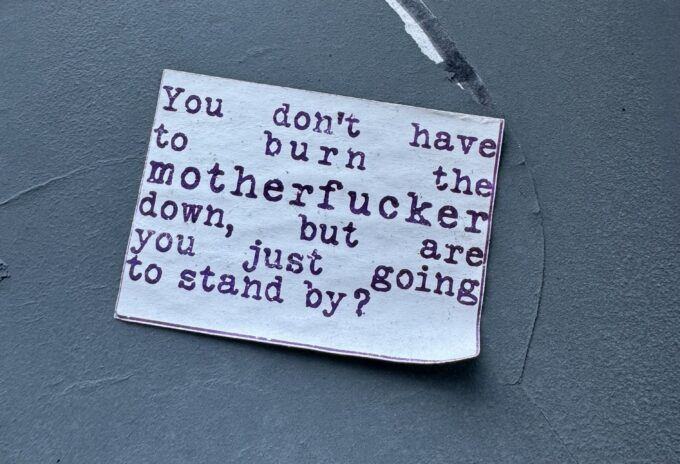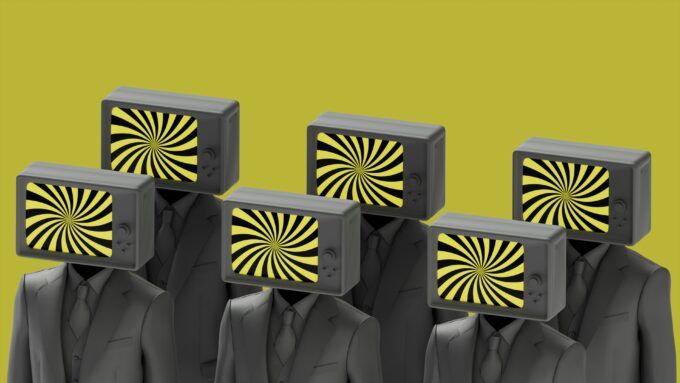Publisched on www.http://readersupportednews.org

When the economy recovers, you’ll still see all these problems persisting for reasons that have nothing to do with money and everything to do with culture.”
Charles Murray, American Enterprise Institute
“`The problem is a puzzle,” he said. `No one has the slightest idea what will work,’ he said. `The cupboard is bare.’”
Sabrina Tavernise, “Rich and Poor Further Apart in Education,” The New York Times, February 10, 2010
Recent studies show a gap of 40% between the test scores of the affluent and low-income students. The New York Times reports that while Charles Murray, who has just published Coming Apart: The State of White America 1960-2010, asserts such a disparity is not caused by wealth but by what the `60s countercultural wrought, the authors of the recent study remain puzzled as to why wealth matters in education.
I’m less puzzled, or, puzzled only by what I’ve just reported.
Money today has a lot to do with culture because we live in a culture that has made the making and possession of ever greater wealth, a cultural highest good. We also live in a culture in which wealth is unevenly divided to such a degree as to subvert any equitable level of political power which means, in short, that we have a plutocracy and not a democracy. Everything in such a culture is Have and Have Not divided, including educating opportunities where wealth matters.
Consider, for example, well-educated parents who can tutor or pay for tutors, or, reading matter beyond a texting and tweeting level. Consider travel to other countries and the inclusion of cultural outings to museums, concerts, lectures, theatre in a possible “things to do” list. Don’t omit a safe neighborhood, a family network of successful friends and encouraging mentors, a room of one’s own, freedom from financial burdens, especially in regard to college tuition, and, most significantly, a nurturing in a world of success that leads one in every way to one’s own graduation into the selfsame world.
What has resulted from the devolution of democracy to plutocracy is that we now live in two stratified domains: one of increasing wealth and one of diminished or diminishing wealth. One domain is a ruling plutocratic domain that is steadily working itself into the protective compounds or fiefs of feudalism while the other is being herded toward the serfdom of medieval fiefdom. There’s nothing puzzling about this gap in literacy in the middle ages nor is there anything puzzling about today’s gap.
But there is a great deal puzzling about why we are puzzled.
I need to say more about this view that wealth has some outsized influence on a pluralistic society. We believe this pluralistic society is filled with challenging values and interpretations as to what the meaning of anything might be. We believe there is no dominating narrative, or, at least one that can dominate our own choices. We live within a sense that another person’s wealth has little to do with our own personal choices, has no shaping influence on our own self-empowered power to be totally “whatever” about wealth and the power it may have. Rather than study the disastrous consequences of plutocracy, we, deep within our illusions of personal will trumping all obstacles, imagine ourselves wealthy at any moment.
How does something like a very severe uneven distribution of wealth affect the education accomplishment of the Have Nots when we are all led to believe that crisis and misfortune are merely spurs to success, that “when the going gets tough, the tough get going”?
I need to first say how wealth affects anything, especially, once again, in a society committed to the notion that only personal choices and a will to power in the face of any obstacles have real effect.
Our economic system, capitalism, had become so rigged with all the inevitability and omnipotence of Harry Potter’s “He-Who-Must-Not-Be-Named” that it has become the dominating designer of American culture. The very notion of rationality has been tied to a self-interest calculated in the purely capitalist way of weighing costs and benefits and choosing an action that increases “personal advantage.” The problem with this view is that capitalism has already established a hierarchy of values that constitutes not only what “self-interest” may be but what’s a cost and what’s a benefit.
Capitalism’s has remained, regardless of whether it’s in a “vulture,” “crony,” “casino” or “Wild West” form, a story that could not be impeached or brought to tria. It could not even be mentioned as lawless, reckless, damaging, riddled by the logic of a roulette wheel, superstitious in its belief in a “self-correcting market” and already guilty of plunging those who had never profited from its profiteering into ruin cyclically. It was and remained a story way out of control. It was a story that swallowed into itself all other stories.
Here we have a Leviathan force within which culture is formed, not the Leviathan that Hobbes had reckoned as a political fire wall against the natural condition of Man — “solitary, poor, nasty, brutish, and short” — but one that totally replaced the need for a strong, central government with the mystique of “an invisible hand of the market.” This mystery would guide a democracy toward a shared but unequal prosperity. Whatever lay in the minds of the Founding Fathers in regard to culture would now be defined and shaped by a law of profit to shareholders, by le ROI, or, Return on Investment.
So the very notion of profit leading to every expanding wealth is a bedrock of a culture that lives within the power of such a story.
At this point, my leftist notion emerges that severe economic inequality would erode gradually or all at once political equality and then the fireworks would begin. In other words, “geography,” the conditions and circumstances of time and place could provoke “counter-narratives,” stories about this inequality and its terrible effects that had the possibility of going “viral.”
We are not at that “viral” stage in which challenging stories to le ROI fill the American mass psyche. We are at, as Occupy Wall Street has show, the finger pointing stage, an important first stage as I argue in Occupying Here & Now: The New Class Warfare. If you recall your fairy tales, which like Super Bowl commercials, stay with us, the beginning of a revolt against monarchical tyranny began with the small chap who said “Why, he ain’t got any clothes on!” in reference to the Emperor.
Political strategists such as Karl Rove and market consultants like Frank Luntz latched on to the postmodern view that stories could only be challenged by other stories and that no one, not even science (witness the global warming battle), story could rise to an unclouded, unbesmirched Truth. And, as Fredric Jameson described it, postmodernity became the cultural logic of late capitalism. The theoretically possible contesting of stories whereby each would be the corrective rod of the other and difference could not be backwatered into the stagnancy of an Emperor Monologue was washed away by the establishment of an Emperor Monologue. It may have no more validity than its own imprimatur, its own self-enclosed logic, no more legitimacy than Wallace Stevens’ Emperor of Ice Cream, but this Emperor Monologue of a capitalism that can only result in plutocracy nurtures and grows the steady flowering of Neoliberalism in the U.S.
To deal with the question that asks in what insidious ways are we regressing to medieval peasantry and the wealthy to their highly secured and protected compounds, we can’t, however, employ Marx because the psychomachia, the battle going on in the American mass psyche can’t be explained by a false consciousness miraculously erased by an awareness of a class struggle.
The wealthy are falling into, or have already arrived, at an obliviousness in regard to the lives of those not among their Facebook friends that like all such ignorance breeds fear and trembling. It is more likely that the vanished and vanishing working and middle class Americans are on Facebook while the Equestrian class is enjoying the “offline” world. They can be found at the 2011 Couture Council Award for artistry’s elegant daytime soiree at Lincoln Center.
For those not invited, OWS would say the 99%, it’s a comfort to retreat to cyberspace travels and Facebook updating when you can’t really afford any longer to do much in the “offline” world. And it’s a boost to ego – call it group support – to update the minutiae of your daily life as at least a virtual assertion that you exist and are important.
The obliviousness of the wealthy to how some 80% of the population lives is, you might say, a psychological and sociological by-product of their wealth. They interact with those not in their class only in the way a feudal baron interacted with a serf. The obliviousness of the 80% who are “struggling” financially is a product of multiple factors: a long residing unconcern with politics and economics when times were good by the Many, a long residing illusion of individual freedom as well as the illusion of self-empowerment, and the distracting escapes and opportunities to “have your say” that cyberspace provides. The Many are distracted and seduced by a hi-tech that is producing and releasing new and absolutely “necessary” transformations of pads, pods and wondrous hand held devices that make the Star Trek “tricorder” look simple.
The low income psyche is in a retreat/escape/victim/loser frame “lost in cyberspace” while the wealthy are affiliating with their kind, from private domains and business citadels all over the globe, occupying a “top of the world” frame of mind from the heights of private jets, penthouses and corner skyscraper offices. You could make the offspring of the low income psyche rebels with causes if they weren’t already distracted by visions of privately constructed rebellions that work quite well in all self designed virtual spaces. You might say that as long as they can pay the cell phone monthly and keep up with the “necessary” apps that they will be “on the phone.”
What is an inspiring exception here has been OWS who have been “on the phone” to mobilize a protesting of the condition our democracy has gotten itself into because of its wealth divide. It is also inspiring to see that credit cards companies have been forced into retreat and that a conservative attack on the finances of Planned Parenthood has been crushed – all through accomplished via cyberspace mobilizing.
The need to “refresh” the psyches of those vanishing into a medieval stupor whereby one works with one’s head down in a medieval “Right to Work” world can be achieved through equitably distributed funding for tax supported public education. That equitable distribution of funding for schools needs to be preceded by a degree of economic equalization that dissolves the isolation and obliviousness caused by such isolation of both rich and poor. When the young interact in class-less classes and partake of each other’s awareness and yearnings, there is a flow and transfer of stories that brings each out of the isolation our drastic wealth divide has created.
We are not proceeding in these directions but allowing “market competitive forces” to improve our schools; we are closer to a flat income tax or no income tax than we are to any effort to bridge the wealth gap through a progressive taxation designed to re-vacuum wealth from the top 20% to the bottom 80%. And while hi-tech provides us with the instrumentation to communicate broadly and urgently as needed, it has also drawn us into private enclaves of private communication.
The idea, if it is an idea, that the power to google where you want and instantaneously get thousands of sites of information somehow broadens the mind that does the searching is puzzling. Does this information we have chosen lead us to a difference and otherness we would never choose but is absolutely required if our understanding is to grow?
Most cynically, I offer the view that plutocracy is not particularly focused on increasing the understanding of those not already possessing wealth and the power that comes with it. Democracy most certainly is interested in public education in order to maintain its egalitarian aspirations, aspirations it must possess or fall back into an aristocratic order which this country revolted against. But when plutocracy already exists and the word “Egalitarian” is as old and over as the word “Nature,” the idea of “public” in any institution or legislation must give way to “private.”
It is axiomatic in plutocracy to not only turn whatever is public to private profit but to move away from the solidarity of what is social and therefore public because social solidarity is potentially threatening to the reign of a plutocracy which is a rule of the many by the few. While capitalism before its globalized gestation enabled by the computer had an interest in the education of the young because the young were its future work force, on every level, globalized techno-capitalism has no greater interest in American young than in Belgian or Swiss or German or any other country.
This disinterest on the part of globalized capitalism in the education of American young goes far in a culture marching to the drum of that globalized capitalism in explaining why American students compare so poorly with students elsewhere. Education of American youth is no longer a priority. This is not a capitalist conspiracy; this is an axiomatic fulfillment of the pursuit of profit here, there and everywhere. It’s a “rational choice” in a culture where capitalism defines what is rational.
Therefore, the increasing gap in literacy and erudition between the sons and daughters of the wealthy and those of the not wealthy cannot even be marked as credit or debit. It simply doesn’t matter. It’s not “costed in” as significant. This will remain puzzling as long as there remains any vestige of a public awareness. When that fades into what I call a medieval stupor of unknowing and uncaring because all attentiveness is directed at somehow paying the monthly “nut,” as would be said in my old Bensonhurst, Brooklyn neighborhood, then we won’t be puzzled any longer.














